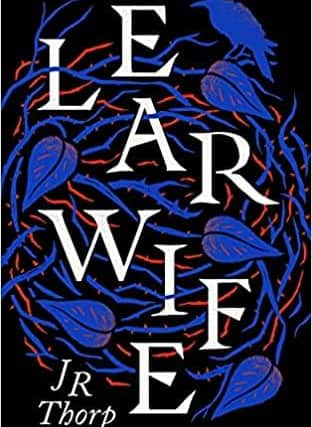Book review: Learwife, by JR Thorp


One thinks of Shakespeare’s Lear as a father rather than a husband, and a widower at that. There are, I think, only a couple of passing references to a wife, the mother of his three daughters, in the play. Nevertheless it’s natural to wonder about her, just as one may wonder how many children Lady Macbeth had. Stern academic critics of the FR Leavis / LC Knights school used to tell us this was the wrong way to read Shakespeare, and that the plays should be regarded as dramatic poems, with the characters having no substance. Given that people have argued about many of them as if they were indeed real people, and that actors strive to inhabit them, this has always seemed to me pretty fair nonsense.
Not only do we argue about them, but many authors have re-imagined them in novels and stories. Robert Nye, for so long the Scotsman’s lead reviewer, wrote a splendid novel entitled Falstaff. Giles Gordon edited a fine book entitled Shakespeare Stories, inviting some 15 or 20 novelists to choose a play or character to re-imagine in a different, often modern, setting, while, if you have ever wondered about the fabled Monster of Glamis, that Scottish master of the short story Fred Urquhart offers an explanation which leads yo back to Macbeth. It’s not, I should warn you, a story for fainthearts or prudes.
Advertisement
Hide AdIt might seem that JR Thorp has been given little by Shakespeare on which to base an account of Lear’s wife. True enough, but this also means she has enjoyed perfect freedom. She is not the first writer to have been drawn to wonder what sort of woman Lear’s wife might have been or which of her daughters may have owed something of their character to her. A hundred or so years ago, the poet Gordon Bottomley wrote a play, King Lear’s Wife, which had, I think, some success on the London stage, though I doubt if it has often, or perhaps ever, been revived. It was written in a poetic prose which owed something to contemporary Irish drama – Synge, Yeats and Lady Gregory. Thorp writes a poetic prose too, often beautifully, though it makes for a somewhat static narrative.


It begins where Shakespeare ended. The marriage broke down long before the events of the play, and the queen was exiled, or confined, to a monastery, with only its Abbess aware of her identity. She has been there for 15 years, and in that time she has been denied all company, even the company of her daughters, Goneril, Regan and Cordelia. They were only girls when she was separated from them – indeed Cordelia was only a baby – so she has had little influence on their upbringing, education and development. This is unfortunate, or rather, by denying the Queen this, Thorp evades what is surely an interesting question, one that many of us must surely have considered when watching or reading the play: how did Goneril and Regan come to be so cruel, Cordelia so saintly, if also obstinate?
Then we wonder why the marriage broke down and why the queen was, as Thorp tells us, confined to her convent prison. We are given a hint early on, strong enough to make the ending less than a twist in the tale. Yet in truth the tale is not a strong one. The novel is written, as is fashionable, in the present tense, and, as usual this makes for some fine word-painting while depriving the narrative of any vigour. Instead of a story, we get a succession of set-pieces, reflections and descriptions. Many of these are pleasing, some beautiful. There is no doubt that Thorp is a talented writer and an ambitious one. Learwife is a first novel, and self-indulgence, displaying the author’s natural ability and gifts, is of course a characteristic of many first novels. The result is a book that cries out for what has sadly become a rarity in the publishing world today: a strong editorial hand. This would have been a better novel at half the length.
Learwife, by JR Thorp, Canongate, 328pp. £14.99
A message from the Editor:
Thank you for reading this article. We're more reliant on your support than ever as the shift in consumer habits brought about by coronavirus impacts our advertisers.
If you haven't already, please consider supporting our trusted, fact-checked journalism by taking out a digital subscription at https://www.scotsman.com/subscriptions